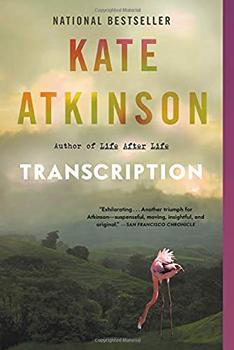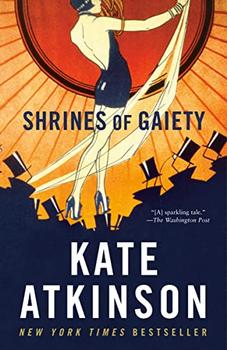Summary | Excerpt | Reviews | Beyond the book | Read-Alikes | Genres & Themes | Author Bio

A dramatic story of WWII espionage, betrayal, and loyalty, by the #1 bestselling author of Life After Life.
In 1940, eighteen-year old Juliet Armstrong is reluctantly recruited into the world of espionage. Sent to an obscure department of MI5 tasked with monitoring the comings and goings of British Fascist sympathizers, she discovers the work to be by turns both tedious and terrifying. But after the war has ended, she presumes the events of those years have been relegated to the past forever.
Ten years later, now a radio producer at the BBC, Juliet is unexpectedly confronted by figures from her past. A different war is being fought now, on a different battleground, but Juliet finds herself once more under threat. A bill of reckoning is due, and she finally begins to realize that there is no action without consequence.
Transcription is a work of rare depth and texture, a bravura modern novel of extraordinary power, wit and empathy. It is a triumphant work of fiction from one of the best writers of our time.
Loyalties, betrayals, being duped into playing for the other side--these are all the standard stuff of spy fiction. But in Atkinson's ingenious novel, she uses these conventions as a springboard to consider larger ideas: individual motivations toward patriotism, the ambiguity of reality, and the slippery nature of time...continued
Full Review
 (703 words)
(703 words)
(Reviewed by Norah Piehl).
 "Roughly speaking, for everything that could be considered an historical fact in this book, I made something up," writes Atkinson in an author's note at the end of Transcription. One thing she did not need to augment with fiction were the amazing stories of the British Broadcasting Company during World War II, many of which are related as still-vivid anecdotes during Juliet's postwar employment there.
"Roughly speaking, for everything that could be considered an historical fact in this book, I made something up," writes Atkinson in an author's note at the end of Transcription. One thing she did not need to augment with fiction were the amazing stories of the British Broadcasting Company during World War II, many of which are related as still-vivid anecdotes during Juliet's postwar employment there.
The BBC offices and studios were considered to be likely targets for German bombing campaigns, so several departments—from Drama to Music and Variety—were transferred to various locations outside the city. Meanwhile, the producers and reporters who remained at BBC headquarters in London came to view the Criterion ...

If you liked Transcription, try these:

by Robert Seethaler
Published 2025
A vibrant tale of love, companionship, and renewal set against the transformations of 1960s Vienna.

by Kate Atkinson
Published 2023
The #1 national bestselling, award-winning author of Life after Life transports us to a restless London in the wake of the Great War--a city fizzing with money, glamour, and corruption--in this spellbinding tale of seduction and betrayal
Show me the books he loves and I shall know the man...
Click Here to find out who said this, as well as discovering other famous literary quotes!